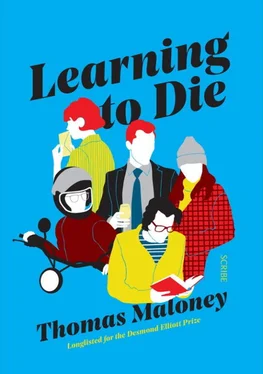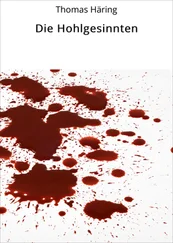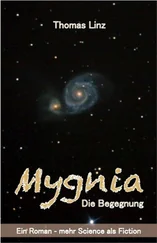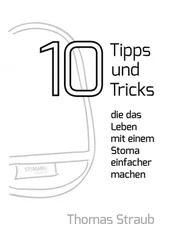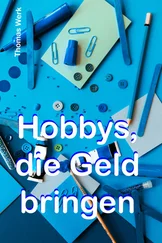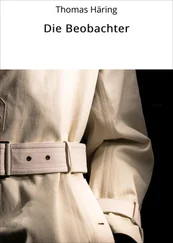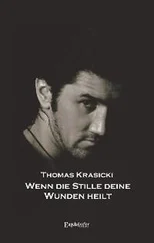He writes four or five poems a day, takes pleasure in squashing them into perfectly round, compacted balls, and then, at high tide, sitting with his back to the usual bollard, flicks them one by one into the appreciative sea.
Natalie Mock is hauled out of a frantic dream by a gentle but persistent tinkling bell, apparently right inside her head. She had a beautiful baby in the dream, about the size of a baby gerbil, but then lost it somewhere in the house and searched with growing desperation, cursing her negligence. The tinkling bell is Dan, fully dressed, stirring a cup of coffee he’s delivered to her bedside table. He grins. The clock says before five.
‘Can you help me get the blunderbuss out front? We have to be quick.’
They stand on the pavement in the bright, birdsung dawn. Dan fits a sort of lid of dark glass over the front of his telescope, slots an eyepiece into place and points the barrel straight along the street towards the sun. He applies his eye and grins again.
‘Tell me what you see.’
What Natalie sees, stooping over the telescope and applying an unpractised eye, is a luminous orange. There’s a little round black spot on the orange, and some even tinier specks and marks.
‘I think there’s some dirt on your lid-thing,’ she says. ‘And maybe a price sticker — a round one.’ Dan grins again.
‘Look again at that round sticker.’
Suddenly her mind begins to grasp what she’s looking at. The orange — it’s the sun — is bright at the centre, dimmer at the edge, as a thing would be if you were peering through a dimmer skin into a potent, glowing core; the marks are not on the glass but, shockingly, etched on the sun’s fiery surface; and the black spot is something else again — not a sticker, not on the glass or on the sun but drifting somewhere in between: a celestial photobomber. A planet. She feels a lift in her stomach as the solar system suddenly seems not an abstraction on children’s posters but a reality upon which she is lightly perched.
She looks up at the empty street, at the empty dawn sky, and at Dan’s face glowing with excitement, and feels a violent heave of loneliness. When Dan is gone, this is what remains: a black stone circling a ball of fire.
‘Venus,’ whispers Dan, squinting, adjusting the telescope’s aim to keep up with the rising sun. ‘Not stopping. Just in transit. The next time this happens—’
‘You don’t have to say it.’
‘The next time this happens,’ he repeats patiently, ‘we’ll both be dead and gone.’ He squeezes her hand, gently but probably as hard as he can. Our fragile existence may seem to divide us, he’s saying, but really it unites us. Yes, but.
When she stoops and looks again, the black circle has drifted, silent and sure and without any of the fuss the rarity of this event seems to demand, closer to the edge.
‘How many improbable things there are, vouched for by trustworthy people, about which we should at least preserve an open mind, even if they do not convince us!’
Montaigne
Mike tells Dan and Natalie to present themselves at Shepperton Lock at four. There’s disabled parking, he says; everything else is arranged, he says. It’s a blazing, pulsating June afternoon with all that entails for the west London traffic, but they arrive at the riverside only mildly late and mildly frazzled to find the miraculous parking space just as Mike promised. A bronzed boy in shorts and flip-flops waves them over to a launch moored with its stern to the bank and a ramp already unfolded. His lithe, undiseased body seems, to Dan, only vaguely subject to the law of gravity.
‘Mr and Mrs Mock?’ he enquires. ‘Guests of Mr Vickers? Step aboard, please!’
Dan pushes aside a ripple of envy. He smiles at Nat, and manoeuvres his chair with an appreciable remnant of that satisfaction peculiar to self-taught expertise. The mooring rope is loosed. Terra firma, traffic and the humdrum world drop quietly away behind them. The launch glides in a breezy arc around the nearest island, past a churning weir, a small marina, a rowing club littered with more tanned bodies and boats, and a parade of houses with immaculate, dreamy gardens. One of the larger gardens is thronged with chattering people, and it is here the launch slows and backs up to a narrow landing stage. Dan steers down the ramp backwards and executes a graceful one-eighty on the striped lawn.
Mike is already strolling down to greet them, tongs in hand, wearing a novelty Statue of David apron over a pink shirt and dazzling white trousers.
‘Old man,’ he says, stooping to embrace Dan. ‘Natalie. Quite an entrance! Welcome.’
It’s hard to mingle by joystick, and though Natalie does her best to intermediate, Dan’s sense of empowerment is soon punctured by the usual awkward smiles and greetings that assail them from both standoffish and overenthusiastic strangers. In fact, it’s worse than usual. To some of Mike’s friends he is invisible — even to some he’s met before — to others a child, and to yet others he’s apparently stark bollock naked. Natalie, fiercely protective and no expert at this game, sometimes makes things worse. Even the most innocuous small talk presents pitfalls to the awkward squad, and Dan finds himself wanting to let them get back to their party.
He has a feeling that not all wheelchairs would have the same effect. A sporty big-wheeler evokes the Paralympics, burly shoulders, basketball; it’s the headrest, he suspects, that really scares people off. A proclamation of mental impairment, of drooling dependency. Dan doesn’t even need the damned headrest — yet — but he’s been advised to keep it in place, in case he gets tired.
‘I wanted to throw a surprise party especially for you,’ confides Mike over the barbecue, after their first circuit. ‘Invite all your friends and family. I had the whole thing worked out. But Nat thought you’d hate me forever for making you the centre of attention. So you’ll have to make do with my friends instead.’
‘Oh, but we love your friends,’ jokes Natalie. ‘Your friends are our friends.’
Mike poles out into the channel and swings gracefully upstream. The punt handles like a dream, providing a welcome fillip to his morale. Dan’s arrival was a shock of the least flattering kind: the shock of new knowledge is honourable enough, but the shock you feel on seeing something you already knew to exist — the child victim of a civil war, what goes on in an abattoir, or your best friend’s wheelchair — is an indictment of your internal dishonesty, and guilt follows close behind.
He takes a deep breath and adjusts his stance. Here, at least, is something that he can do well. When he should have been learning maths twelve years ago, or repaying his privilege in some other service to mankind, he was perfecting the art of prodding an elongated, upholstered crate along a river with studied nonchalance. It’s gratifying to finally see a return on the investment.
Seated side by side on the velvet are Victoria, in a shoulderless red-and-gold number that’s trying just a little too hard, and Lulu in floral perfection. Not a seating arrangement they would have chosen, but neither wanted to be the one left behind and they’re both coping with characteristic grace. On the nearer seat, at Mike’s feet, facing forward and with her simple straw hat obscuring his view of her face, sits Natalie. She didn’t want to leave Dan, but he insisted. It’s just possible that he wanted to escape her constant, ministering presence. Let his hair down.
Confronted by two of the most beautiful women he has ever met, silently competing to arrange their flawless legs to the most devastating effect, Mike nevertheless finds his gaze drawn downward towards Natalie. Her predicament troubles him in ways he hasn’t explored — ways related to, but distinct from his pain and pity for Dan. When she turns her head to the left or right he gets an eyeful of pallid breast and looks up guiltily.
Читать дальше
